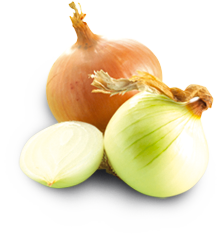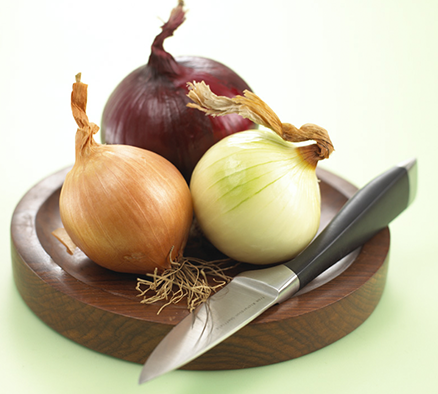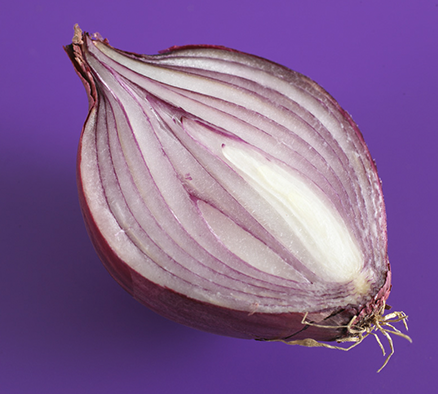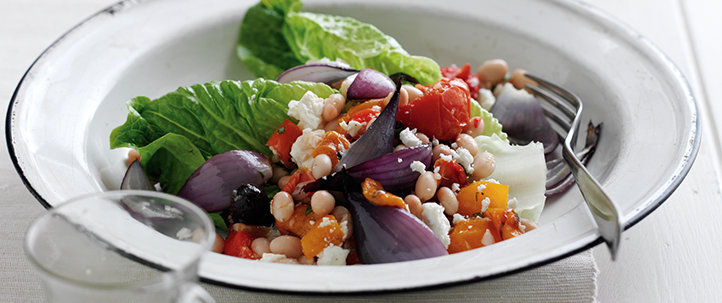

The World's Finest





The World's Finest



Onion skins contain quercetin, a potent natural anti-histamine and anti-inflammatory shown to help hay fever sufferers, according to Dutch researchers. Onions contain three times as much quercetin as Kale – the next richest source – and 10 times as much as Broccoli– but any amount of onion will help.
The health benefits of onions are frequently overlooked or even unknown. Containing powerful compounds such as quercetin and chromium, studies reveal that this kitchen staple has many hidden talents making it the diamond of the vegetable world.
Quercetin, which is recognised as being a more potent antioxidant than vitamin E, is a multi-tasking flavonoid which helps to keep the body in peak condition, helping to fight a variety of illnesses ranging from the common cold to colon, prostate and breast cancer. Onions are an effective source of this increasingly valued compound; in fact, absorption of quercetin from onions is twice that from tea and three times that from apples.
Onions also contain very high levels of chromium which helps maintain a positive hormone balance that can help combat PMS symptoms.
Some experts believe that as little as two to three onions per week can have a significantly positive impact on health. And even better news, onions don’t have to be eaten raw to maximise their health benefits – quercetin is relatively stable while being cooked so retains all its powerful goodness to aid overall wellbeing.
Onion extracts are also recognised by World Health Organisation (WHO) for providing relief in the treatment of coughs and colds, asthma and bronchitis.
Founder of The Food Doctor, author, broadcaster and health journalist Ian Marber comments: “The term superfoods tends to be applied to nearly everything these days, but the humble onion does offer far more benefits than most vegetables owing to its potent antioxidant and probiotic effects.”
Quercetin: Quercetin belongs to a class of water-soluble plant pigments called flavonoids. It is the most studied flavonoid because it is among the most abundant; a more potent antioxidant than vitamin E, according to some research.
Quercetin has displayed considerable anti-inflammatory activity, restraining both the production and release of histamine and other allergic and inflammatory sources.
Cooking meats with onions may help reduce the amount of carcinogens produced when meat is cooked using high heat methods, such as on the barbeque (quercetin appears to survive the heat of cooking). Quercetin may also help reduce symptoms like fatigue, depression and anxiety.
Flavonoids: Flavonoids promote a healthy heart; Onions are rich in flavonoids which help reduce the risk of heart disease. In some studies, onions have been singled out as one of a very small number of fruit and vegetables to promote a significant reduction in the risk of heart disease. Of the more than 100,000 individuals who participated in these studies, those whose diets most frequently included onions, tea, apples and broccoli – the richest sources of flavonoids – benefited from a 20% reduction in the risk of heart disease.
Flavonoids are most commonly known for their antioxidant activity and are commonly referred to as bioflavonoids in the media – the terms are equivalent and interchangeable, for flavonoids are biological in origin.
Chromium: Onions contain very high levels of chromium which can help maintain a positive hormone balance and pre-menstrual tension (PMT) symptoms. Chromium is a molecule that helps cells respond appropriately to insulin. Clinical studies of diabetics have shown that chromium can decrease fasting blood glucose levels, improve glucose tolerance, lower insulin levels, and decrease total cholesterol and triglyceride levels, while increasing good HDL-cholesterol levels thus reducing cholesterol. Chromium can also help prevent those annoying mid-afternoon energy slumps.
Natural Prebiotics: Prebiotics are non-digestible food ingredient that when consumed, stimulate the growth and function of certain “good” bacteria in the gut (probiotics). Common food sources of prebiotics include: onions, garlic, banana and asparagus. Prebiotics encourage the friendly bacteria to flourish, helping to support our natural defences; research to date has demonstrated that prebiotics can improve common and chronic complaints such as Irritable Bowel Syndrome (IBS), acne, food allergies, Chronic Fatigue and depression.
GPCS: Research by the University of Bern (Switzerland) found that onions contain GPCS peptide, which is said to inhibit loss of bone minerals and calcium, making onions effective against osteoporosis.

We’ve just added a range of new recipes to the site, including some step-by-step videos to guide you through the process. Check them out here!